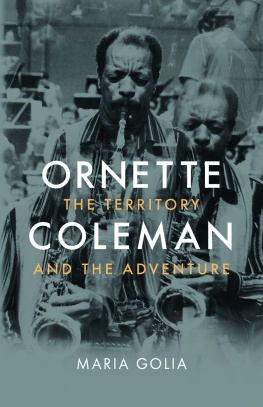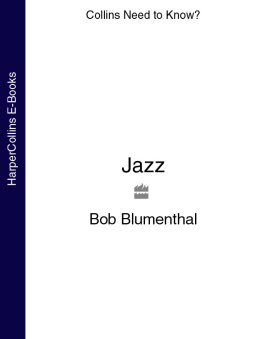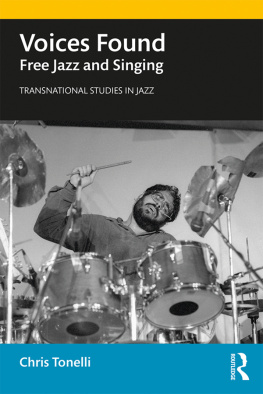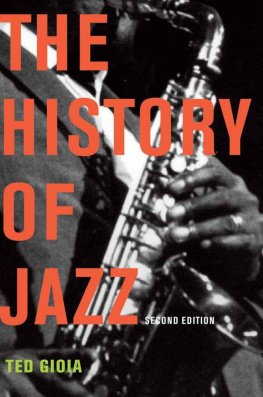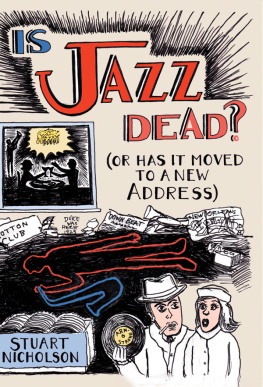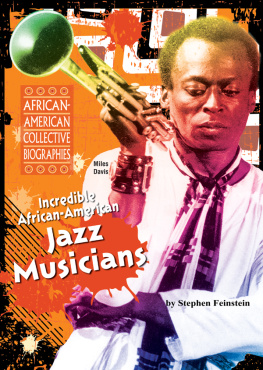ORNETTE
THE TERRITORY
COLEMAN
AND THE ADVENTURE
MARIA GOLIA
REAKTION BOOKS LTD
To the memory of my brother
Francis J. Golia Jr.,
(August 10, 1945February 2, 2019)
musician, educator, and composer,
one for the books.
Published by
Reaktion Books Ltd
Unit 32, Waterside
4448 Wharf Road
London N1 7UX, UK
www.reaktionbooks.co.uk
First published 2020
Copyright Maria Golia 2020
All rights reserved
No part of this publication may be reproduced, stored in a retrieval system, or transmitted, in any form or by any means, electronic, mechanical, photocopying, recording or otherwise, without the prior permission of the publishers
Page references in the Photo Acknowledgments and
Index match the printed edition of this book.
Printed and bound in Great Britain by
TJ International, Padstow, Cornwall
A catalogue record for this book is available from the British Library
eISBN 9781789142631
CONTENTS
Music, states of happiness, mythology, faces worn by time, certain twilights and certain places, all want to tell us something... or are about to tell us something: that imminence of a revelation as yet unproduced is, perhaps, the aesthetic fact.
JORGES LUIS BORGES,
The Wall and the Books (1959)

Sleeve of The Art of the Improvisers (Atlantic, 1970), reproducing a painting by Ornette Coleman.
Introduction
The theme you play at the start of the number is the territory. And what comes after, which may have very little to do with it, is the adventure.
ORNETTE COLEMAN (March 9, 1930June 11, 2015)
T he individuals who may be said to define an era have distilled its characteristic forces and possibilities into a body of work that in turn informed their times. Born in segregated Fort Worth, Texas, during the Great Depression, African American composer and musician (sax, trumpet, violin) Ornette Coleman was zeitgeist incarnate. Steeped in the Texas blues tradition, he and jazz grew up together, as the brassy blare of big band swing gave way to bebop, a faster music for a faster, postwar world. If jazz were an aircraft, then New Orleans trumpeter Louis Armstrong winged it over the Atlantic, Kansas City saxophonist Charlie Parker shattered the sound barrier, and Ornette achieved escape velocity, forging a breakaway art appropriate to the Space Age, often referred to as free jazz.
I met Ornette in his hometown at the Caravan of Dreams Performing Arts Center where I worked and where he played and recorded in the 1980s. He was unassuming and soft-spoken; he lisped and wore shirts that resembled painters drop cloths, but he was tougher than he looked. Self-taught and proud, Ornette had a nonconformist approach to music that attracted ridicule and censure. Marginalized by his peers for abandoning jazz conventions and feared for the unmistakable authenticity of his sound, he posed a threat to the status quo and to the musicians who staked their careers on it. It would have been simpler to join the in-crowd but Ornette held his course and made the margins the place to be. How do I turn emotion into knowledge? Thats what I try to do with my horn, he said. Ornette used music to advance his self-understanding and in doing so, expanded the musical boundaries of the known.
Jazz is considered a democratic music for the equal weight it gives the individual and the collective, where the ensembles role is not to subsume its members but to make room for their greater expression. Integral to the language of jazz is improvisation, the art of the immediate, an interactive process involving receptive listening and cogent response that Ornette wished to rescue from ephemerality by presenting it as a model for all genuine communication. His approach to music would reach beyond jazz to touch all manner of creative endeavor, and it is no coincidence that reviewers wrote some of their most inspired prose when describing Ornettes sound.
More a compendium than a comprehensive biography or technical analysis, this book helps contextualize Ornettes work, using archival and primary sources to describe some of the pivotal places, people, and struggles that shaped his music and his life. It begins in Fort Worth, a hardscrabble town where music was the only thing that brought black and white citizens together aside from the latters need for cheap labor. (Coming Up) reconstructs the social conditions and sonic ambiance of Ornettes youth, an idiosyncratic collage of radio broadcasts from Harlem, western swing fiddlers, Tejano two-steps, high-school marching bands, and the rhythm and blues (R&B) that issued from storefront churches where congregations spoke in tongues.
I created everything about me, Ornette once said, but he was heir to an exceptional legacy. Texas produced innovators at every stage of jazz evolution, from blues and ragtime to bebop and beyond. Music flourished in the dives and dance halls of Ornettes hometown, frequented by Texan contributors to jazz history who influenced, mentored, or collaborated with him. While Fort Worth and nearby Dallas were not jazz crucibles like New Orleans, New York, or Los Angeles, Texas was nonetheless a field of encounter and synthesis. Musicians who left home seeking a living roamed the vast Southwest in fluidly configured territory bands, folding the impressions they found on the road into their homegrown sound. Restlessness and mobility were built into Ornettes generation; inured to discrimination and hardship, and intent on overcoming them, musicians were explorers charting new ground and eager to share their discoveries.
(Ignition) tracks Ornettes music-driven trajectory from Texas via New Orleans and Los Angeles to New York, where he found a home, and Europe, where he communed with the fervent free jazz diaspora he helped create. By the time he arrived in New York in 1959, jazz had become aware of itself and its strengths, with intellectual bebop and its technical prowess the accepted norm. Ornette and a handful of contemporaries found this self-consciousness restrictive and contrary to the purpose of deeper exploration. His album Free Jazz (1961) lent a name to what he and his companions were after, but Ornette disliked the connotation of randomness. His music required discipline and mastery alongside an alertness of body, intellect, emotion, and memory. If this was freedom, skillful vigilance was its price.
The same heightened awareness of possibilities and urge to rebel against constraints was manifest in painting, theater, literature, dance, film, and photography. The 1960s witnessed an exuberant cross-fertilization of the arts as practitioners of every discipline staked out new, overlapping territories, sharing inspiration and resources, with jazz embodying the values of experimentation and collaboration that characterized an increasingly international avant-garde. The same impulses driving artists guided movements that challenged authority, taking a stand against war, racism, and inequality, a wave of change that swept across the Atlantic. Ornette pursued his lines of inquiry immersed in a milieu he helped advanceof open doors, loft jams, chance meetings, group performances, conversations, and projectsa lifestyle that reaffirmed the interconnectedness of both the arts and human beings that he called unison.

